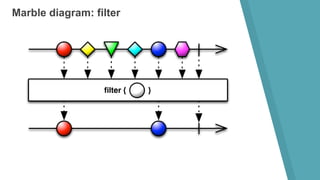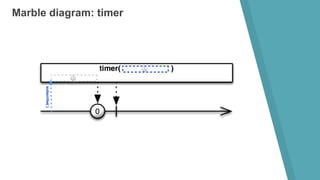RxJava applied [JavaDay Kyiv 2016]
- 1. RxJava Applied: Concise Examples where It Shines Igor Lozynskyi JavaDay Kyiv - Oct 14-15, 2016 Software Engineer at GlobalLogic
- 3. Outline ● RxJava vs Java 8 Streams ● RxJava usage example
- 4. Pre Java 8 data processing interface Iterator<T> { T next(); boolean hasNext(); void remove(); }
- 5. Pre Java 8 data processing List<Employee> employees = service.getEmployees(); Map<Integer, List<Employee>> ageDistribution = new HashMap<>(); for (Employee employee : employees) { if (employee.getAge() > 25){ List<Employee> thisAge = ageDistribution.get(employee.getAge()); if (thisAge != null){ thisAge.add(employee); } else{ List<Employee> createThisAge = new ArrayList<>(); createThisAge.add(employee); ageDistribution.put(employee.getAge(), createThisAge); } } } System.out.println(ageDistribution);
- 6. Java 8 Stream ... ● Connects data source and client ● Do not hold any data ● Implements map / filter / reduce pattern ● Enforces functional style of data processing
- 7. Stream collectors List<Employee> employees = service.getEmployees(); Map<Integer, List<Employee>> ageDistribution = new HashMap<>(); for (Employee employee : employees) { if (employee.getAge() > 25) { List<Employee> thisAge = ageDistribution.get(employee.getAge()); if (thisAge != null){ thisAge.add(employee); } else { List<Employee> createThisAge = new ArrayList<>(); createThisAge.add(employee); ageDistribution.put(employee.getAge(), createThisAge); } } } System.out.println(ageDistribution);
- 8. Stream collectors List<Employee> employees = service.getEmployees(); Map<Integer, List<Employee>> ageDistribution = employees.stream() .filter(e -> e.getAge() > 25) .collect(Collectors.groupingBy(Employee::getAge)); System.out.println(ageDistribution);
- 9. Stream collectors List<Employee> employees = service.getEmployees(); Map<Integer, Long> ageDistribution = employees.stream() .filter(e -> e.getAge() > 25) .collect(Collectors.groupingBy( Employee::getAge, Collectors.counting() ));
- 10. Stream sources Stream<String> stream1 = Arrays.asList("A", "B").stream(); Stream<String> stream2 = Stream.of("Q", "P", "R"); IntStream chars = "some text".chars(); Stream<String> words = Pattern.compile(" ").splitAsStream("some other text");
- 11. Non-standard stream sources Can we use non-standard stream sources? ?
- 12. Stream generator Stream .generate(() -> UUID.randomUUID().toString()) .limit(4) .forEach(System.out::println);
- 13. Spliterator interface public interface Spliterator<T> { boolean tryAdvance(Consumer<? super T> action); Spliterator<T> trySplit(); long estimateSize(); int characteristics(); }
- 14. class RandomSpliterator implements Spliterator<String> { public boolean tryAdvance(Consumer<? super String> action) { action.accept(UUID.randomUUID().toString()); return true; } // for parallel streams public Spliterator<String> trySplit() { return null; } public long estimateSize() { return Long.MAX_VALUE; }; public int characteristics() { return NONNULL | DISTINCT; } }
- 15. Generate sequence: 1, 2, 2, 3, 3, 3, 4, 4, 4, 4, ... IntStream sequence = IntStream.rangeClosed(1, 50) .flatMap(i -> IntStream.iterate(i, identity()).limit(i) ); sequence.forEach(System.out::println);
- 16. Stream API is powerful!
- 17. Stream API - async processing getEmployeeIds().stream() .map(this::doHttpRequest) .collect(Collectors.toList()) Output: [main] processing request: c677c497 [main] processing request: 3b5320a9 [main] processing request: 9248b92e [main] processing request: 97a68a53
- 18. Stream API - async processing getEmployeeIds().stream() .parallel() .map(this::doHttpRequest) .collect(Collectors.toList()) Output: [main] processing request: 7674da72 [ForkJoinPool.commonPool-worker-2] processing request: 747ae948 [ForkJoinPool.commonPool-worker-1] processing request: 33fe0bac [ForkJoinPool.commonPool-worker-3] processing request: 812f69f3 [main] processing request: 11dda466 [ForkJoinPool.commonPool-worker-2] processing request: 12e22a10 [ForkJoinPool.commonPool-worker-1] processing request: e2b324f9 [ForkJoinPool.commonPool-worker-3] processing request: 8f9f8a97
- 19. Stream API - async processing ForkJoinPool forkJoinPool = new ForkJoinPool(80); forkJoinPool.submit(() -> getEmployeeIds().stream() .parallel() .map(this::doHttpRequest) .collect(Collectors.toList()) ).get();
- 20. Stream API has some limitations
- 21. Reactive Streams: what the difference
- 23. Short history ● From 2009 for .NET ● From 2013 for JVM (latest: 1.2.1, Oct 5, 2016) ● Now a lot of other languages
- 24. RxJava Observer interface Observer<T> { void onNext(T t); void onCompleted(); void onError(Throwable e); }
- 25. RxJava Subscription interface Subscription { void unsubscribe(); boolean isUnsubscribed(); }
- 26. Observable ● Central class in RxJava library ● It’s big: ~ 10k lines of code (with comments) ● It’s complex: ~ 100 static methods, ~ 150 non-static
- 27. Subscription sub = Observable .create(s -> { s.onNext("A"); s.onNext("B"); s.onCompleted(); }) .subscribe(m -> log.info("Message received: " + m), e -> log.warning("Error: " + e.getMessage()), () -> log.info("Done!")); Output: Message received: A Message received: B Done!
- 28. Observable<Integer> empty = Observable.empty(); Observable<Integer> never = Observable.never(); Observable<Integer> error = Observable.error(exception); Observable useful for tests never() - never emit anything (no data, no errors)
- 29. public static <T, Resource> Observable<T> using( final Func0<Resource> resourceFactory, final Func1<Resource, Observable<T>> observableFactory, final Action1<Resource> disposeAction ){ } Observable from resource
- 30. Observable .from(Arrays.asList(1, 2, 5, 7, 8, 12, 3, 6, 7, 8)) .filter(i -> (i > 3 && i < 8)) .forEach(System.out::println); Output: 5 7 6 7
- 37. Time series Observable<Long> timer = Observable.timer(2, TimeUnit.SECONDS); Observable<Long> interval = Observable.interval(1, TimeUnit.SECONDS); timer.forEach(System.out::println); interval.forEach(System.out::println); Output: Process finished with exit code 0
- 38. Time series Observable<Long> timer = Observable.timer(2, TimeUnit.SECONDS); Observable<Long> interval = Observable.interval(1, TimeUnit.SECONDS); timer.forEach(i -> System.out.println(currentThread().getName() + " - " + i)); interval.forEach(i -> System.out.println(currentThread().getName() + " - " + i)); Output: RxComputationThreadPool-2 - 0 RxComputationThreadPool-1 - 0 RxComputationThreadPool-2 - 1 Process finished with exit code 0 Thread.sleep(2000);
- 39. Schedulers public final class Schedulers { public static Scheduler immediate() {...} public static Scheduler trampoline() {...} public static Scheduler newThread() {...} public static Scheduler computation() {...} public static Scheduler io() {...} public static TestScheduler test() {...} public static Scheduler from(Executor executor) {...} }
- 40. Schedulers Observable.from("one", "two", "three", "four", "five") .subscribeOn(Schedulers.newThread()) .observeOn(AndroidSchedulers.mainThread()) .subscribe(/* an Observer */);
- 42. Merge Observable<Integer> odds = Observable .just(1, 3, 5).subscribeOn(Schedulers.io()); Observable<Integer> evens = Observable.just(2, 4, 6); Observable.merge(odds, evens) .subscribe( System.out::println, System.err::println, () -> System.out.println("Finished"));
- 44. Zip Observable<String> odds = Observable.just("A", "B", "C", "D"); Observable<Integer> evens = Observable.just(2, 4, 6); Observable.zip(odds, evens, (a, b) -> a + "-" + b) .subscribe( System.out::println, System.err::println, () -> System.out.println("Finished")); Output: A-2 B-4 C-6 Finished
- 45. Cold & Hot Observables ● Cold Observable emits events only having subscriber ● Hot Observable emits events even without subscribers
- 46. Backpressure
- 47. Backpressure Backpreasure is a way to slow down emission of elements It can act on observing side Strategies: ● Buffering items (buffer, window) ● Skipping items (sampling, throttling, etc) ● Request for specific number of elements
- 48. Backpressure: request for elements public interface Producer { void request(long n); }
- 49. Stream API vs RxJava RxJava: ● allows to process data in chosen thread, this is useful for IO, computations, specialized threads (GUI threads), ● allows synchronization on clocks and application events, ● works in push mode, producer initiates data transfer, but consumer may control data flow via backpressure. Stream API: ● tuned for hot data processing, ● good for parallel computation, ● has rich set of collectors for data.
- 50. Shakespeare Plays Scrabble Benchmark (throughput) Non-Parallel Streams 44.995 ± 1.718 ms/op Parallel Streams 14.095 ± 0.616 ms/op RxJava 310.378 ± 9.688 ms/op RxJava (2.0.0-RC4) 156.334 ± 8.423 ms/op Performance Based on JMH benchmark by Jose Paumard
- 51. Scenarios where RxJava shines ● Observables are better callbacks (easily wrap callbacks) ● Observables are highly composable (on contrast with callbacks) ● Provide async stream of data (on contrast with CompletableFuture) ● Observables can handle errors (have retry / backup strategies) ● Give complete control over running threads ● Good for managing IO rich application workflows ● Perfect for Android development (no Java 8 required, retrolambda compatible) ● Netflix uses RxJava for most their internal APIs
- 52. Request flow Created with draw.io
- 53. Stream API and RxJava are friends! You can easily build Observable from Stream Iterator<T> iterator = ...; Observable<T> observable = Observable.from(() -> iterator); You can map Observable to Stream by implementing adapter public static<T> Iterator<T> of(Observable<? extends T> ob){ class Adapter implements Iterator<T>, Consumer<T> { ... } return new Adapter(); }
- 54. External libraries that work with RxJava ● hystrix - latency and fault tolerance bulkheading library ● camel RX - to reuse Apache Camel components ● rxjava-http-tail - allows you to follow logs over HTTP ● mod-rxvertx - extension for VertX that provides support Rx ● rxjava-jdbc - use RxJava with JDBC to stream ResultSets ● rtree - immutable in-memory R-tree and R*-tree with RxJava ● and many more ...
- 55. RxJava is not new JDeferred CompletableFuture<T> Scala.Rx Scala Actors Spring Integration
- 56. What’s around? ● Google Agera - reactive streams for Android by Google ● Project Reactor - flow API implementation by Pivotal & Spring ● Akka-Streams - Akka based streams ● Monix - Scala based implementation of Reactive Streams ● Vert.x, Lagom - if you want more than streams
- 57. Let’s build something with RxJava
- 58. Use case: Stream of tweets Created with Balsamiq Mockups
- 59. Twitter API Twitter Stream API (WebSocket alike): ● Doc: https://dev.twitter.com/streaming/overview ● Library: com.twitter:hbc-core:2.2.0 Twitter REST API: ● GET https://api.twitter.com/1.1/users/show.json?screen_name=jeeconf ● GET https://api.twitter.com/1.1/search/tweets.json?q=from:jeeconf
- 60. Let’s look at entities class Tweet { String text; int favorite_count; String author; int author_followers; } class Profile { String screen_name; String name; String location; int statuses_count; int followers_count; } class UserWithTweet { Profile profile; Tweet tweet; }
- 61. Marble diagram
- 62. Profile getUserProfile(String screenName) { ObjectMapper om = new ObjectMapper(); return (Profile) om.readValue(om.readTree( Unirest.get(API_BASE_URL + "users/show.json") .queryString("screen_name", screenName) .header("Authorization", bearerAuth(authToken.get())) .asString() .getBody()), Profile.class); } Get user profile synchronously
- 63. Get user profile asynchronously Observable<Profile> getUserProfile(String screenName) { return Observable.fromCallable(() -> { ObjectMapper om = new ObjectMapper(); return (Profile) om.readValue(om.readTree( Unirest.get(API_BASE_URL + "users/show.json") .queryString("screen_name", screenName) .header("Authorization", bearerAuth(authToken.get())) .asString() .getBody()), Profile.class); }); }
- 64. Add some errors handling Observable<Profile> getUserProfile(String screenName) { if (authToken.isPresent()) { return Observable.fromCallable(() -> { ObjectMapper om = new ObjectMapper(); return (Profile) om.readValue(om.readTree( Unirest.get(API_BASE_URL + "users/show.json") .queryString("screen_name", screenName) .header("Authorization", bearerAuth(authToken.get())) .asString() .getBody()), Profile.class); }).doOnCompleted(() -> log("getUserProfile completed for: " + screenName)); } else { return Observable.error(new RuntimeException("Can not connect to twitter")); } }
- 65. Let’s do something concurrently Illustration: Arsenal Firearms S.r.l.
- 67. Get data concurrently Observable<UserWithTweet> getUserAndPopularTweet(String author){ return Observable.just(author) .flatMap(u -> { Observable<Profile> profile = client.getUserProfile(u) .subscribeOn(Schedulers.io()); Observable<Tweet> tweet = client.getUserRecentTweets(u) .defaultIfEmpty(null) .reduce((t1, t2) -> t1.retweet_count > t2.retweet_count ? t1 : t2) .subscribeOn(Schedulers.io()); return Observable.zip(profile, tweet, UserWithTweet::new); }); }
- 69. Let’s subscribe on stream of tweets!
- 71. streamClient.getStream("RxJava", "JavaDay", "Java", "Trump", "Hillary")
- 72. streamClient.getStream("RxJava", "JavaDay", "Java", "Trump", "Hillary") .distinctUntilChanged() .map(p -> p.author) .flatMap(name -> getUserAndPopularTweet(name)) .subscribeOn(Schedulers.io()) .observeOn(Schedulers.immediate()) .subscribe(p -> log.info("The most popular tweet of user " + p.profile.name + ": " + p.tweet)); .scan((u1, u2) -> u1.author_followers > u2.author_followers ? u1 : u2)
- 73. streamClient.getStream("RxJava", "JavaDay", "Java", "Trump") .scan((u1, u2) -> u1.author_followers > u2.author_followers ? u1 : u2) .distinctUntilChanged() .map(p -> p.author) .flatMap(name -> { Observable<Profile> profile = client.getUserProfile(name) .subscribeOn(Schedulers.io()); Observable<Tweet> tweet = client.getUserRecentTweets(name) .defaultIfEmpty(null) .reduce((t1, t2) -> t1.retweet_count > t2.retweet_count ? t1 : t2) .subscribeOn(Schedulers.io()); return Observable.zip(profile, tweet, UserWithTweet::new); }) .subscribeOn(Schedulers.io()) .observeOn(Schedulers.immediate()) .subscribe(p -> log.info("The most popular tweet of user " + p.profile.name + ": " + p.tweet));
- 74. Marble diagram
- 75. @Test public void correctlyJoinsHttpResults() throws Exception { String testUser = "testUser"; Profile profile = new Profile("u1", "Name", "USA", 10, 20, 30); Tweet tweet1 = new Tweet("text-1", 10, 20, testUser, 30); Tweet tweet2 = new Tweet("text-2", 40, 50, testUser, 30); TwitterClient client = mock(TwitterClient.class); when(client.getUserProfile(testUser)).thenReturn(Observable.just(profile)); when(client.getUserRecentTweets(testUser)).thenReturn(Observable.just(tweet1, tweet2)); TestSubscriber<UserWithTweet> testSubscriber = new TestSubscriber<>(); new Solutions().getUserAndPopularTweet(client, testUser).subscribe(testSubscriber); testSubscriber.awaitTerminalEvent(); assertEquals(singletonList(new UserWithTweet(profile, tweet2)), testSubscriber.getOnNextEvents()); }
- 76. Don’t believe it works?
- 77. ● API is big (150+ methods to remember) ● Requires to understand underlying magic ● Hard to debug ● Don’t forget about back pressure Conclusions: pitfalls
- 78. ● It is functional, it is reactive* ● Good for integration scenarios ● Allows to control execution threads ● Easy to compose workflows ● Easy to integrate into existing solutions ● Easy Ok to test * RxJava is inspired by FRP (Functional Reactive Programming), but doesn’t implement it Conclusions: strength
- 79. ● RxJava 2.0 in few weeks! ● RxJava 2.0 is better and faster ● RxJava 2.0 is Java 9 Flow API compatible ● We will see more and more reactive streams Conclusions: future
- 81. Thanks Presentation template by SlidesCarnival @siromaha [email protected]

















![Stream API - async processing
getEmployeeIds().stream()
.map(this::doHttpRequest)
.collect(Collectors.toList())
Output:
[main] processing request: c677c497
[main] processing request: 3b5320a9
[main] processing request: 9248b92e
[main] processing request: 97a68a53](https://image.slidesharecdn.com/pdfrxjava-appliedjavaday-161013154948/85/RxJava-applied-JavaDay-Kyiv-2016-17-320.jpg)
![Stream API - async processing
getEmployeeIds().stream()
.parallel()
.map(this::doHttpRequest)
.collect(Collectors.toList())
Output:
[main] processing request: 7674da72
[ForkJoinPool.commonPool-worker-2] processing request: 747ae948
[ForkJoinPool.commonPool-worker-1] processing request: 33fe0bac
[ForkJoinPool.commonPool-worker-3] processing request: 812f69f3
[main] processing request: 11dda466
[ForkJoinPool.commonPool-worker-2] processing request: 12e22a10
[ForkJoinPool.commonPool-worker-1] processing request: e2b324f9
[ForkJoinPool.commonPool-worker-3] processing request: 8f9f8a97](https://image.slidesharecdn.com/pdfrxjava-appliedjavaday-161013154948/85/RxJava-applied-JavaDay-Kyiv-2016-18-320.jpg)















































![RxJava applied [JavaDay Kyiv 2016]](https://image.slidesharecdn.com/pdfrxjava-appliedjavaday-161013154948/85/RxJava-applied-JavaDay-Kyiv-2016-66-320.jpg)

![RxJava applied [JavaDay Kyiv 2016]](https://image.slidesharecdn.com/pdfrxjava-appliedjavaday-161013154948/85/RxJava-applied-JavaDay-Kyiv-2016-68-320.jpg)












